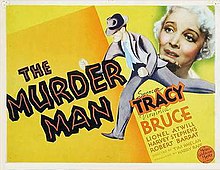The Murder Man
| The Murder Man | |
|---|---|
 | |
| Directed by | Tim Whelan |
| Written by | Screenplay: Tim Whelan John C. Higgins Story: Tim Whelan Guy Bolton |
| Produced by | Harry Rapf |
| Starring | Spencer Tracy Virginia Bruce Lionel Atwill Harvey Stephens Robert Barrat James Stewart |
| Cinematography | Lester White |
| Edited by | James E. Newcom |
| Music by | William Axt |
Production company | |
Release date |
|
Running time | 70 minutes |
| Country | United States |
| Language | English |
| Budget | $167,000[1] |
| Box office | $546,000[1] |
The Murder Man is a 1935 American crime-drama film starring Spencer Tracy, Virginia Bruce, and Lionel Atwill, and directed by Tim Whelan. The picture was Tracy's first film in what would be a twenty-year career with MGM. Tracy plays an investigative reporter who specializes in murder cases. The film is notable as the feature film debut of James Stewart (who had previously appeared in a Shemp Howard comedy short called Art Trouble). Stewart has sixth billing as a reporter named Shorty.
Plot

Steve Grey (Spencer Tracy) is a hotshot New York newspaper reporter specializing in murder. When a crooked businessman named Halford is murdered, Steve pins the blame on the dead man's associate, Henry Mander (Harvey Stephens), theorizing that Halford was killed by a rifle from a shooting gallery across the street.
Mander is arrested, tried, convicted and sentenced to death. Steve visits his father, who is depressed because his business has been ruined. The hard-working, hard-drinking Steve is urged by Mary (Virginia Bruce), a gossip columnist who loves him, to take some time off.
Another colleague, Shorty (James Stewart), arrives to tell Steve that their editor wants an exclusive interview with Mander in prison. He goes to Sing Sing to conduct the interview.
Driven by guilt, Steve shocks everyone by confessing to having committed the murder himself, as revenge for Halford and Mander having ruined his father. Steve's last act is to tell his editor that he's got his biggest story ever.
Cast
- Spencer Tracy as Steve Grey
- Virginia Bruce as Mary
- Lionel Atwill as Capt. Cole
- Harvey Stephens as Henry Mander
- Robert Barrat as Robins
- James Stewart as Shorty
- William Collier, Sr. as Pop Grey
- Bobby Watson as Carey Booth
- William Demarest as Red Maguire
- John Sheehan as Sweeney
- Lucien Littlefield as Rafferty
- George Chandler as Sol Hertzberger
- Fuzzy Knight as Buck Hawkins
- Louise Henry as Lillian Hopper
- Robert Warwick as Colville
- Joe Irving as Tony
- Ralph Bushman as Pendleton
Reception
Writing for The Spectator, Graham Greene praised Tracy's acting, describing his portrayal of Steve Grey as "as certain as a mathematical formula" and noting that the scene of confrontation between Grey and Henry Mander (portrayed by Harvey Stephens) gave Tracy the chance "of showing the reserve of power behind the ease".[2]
Box office
According to MGM records the film earned $344,000 in the US and Canada and $202,000 elsewhere resulting in a profit of $184,000.[1]
References
- ^ a b c The Eddie Mannix Ledger, Los Angeles: Margaret Herrick Library, Center for Motion Picture Study.
- ^ Greene, Graham (23 August 1935). "Where's George?/The Great God Gold/Boys Will Be Boys/The Murder Man". The Spectator. (reprinted in: John Russel, Taylor, ed. (1980). The Pleasure Dome. p. 16. ISBN 0192812866.)
External links
- The Murder Man at IMDb
- The Murder Man at the TCM Movie Database
- The Murder Man at AllMovie
